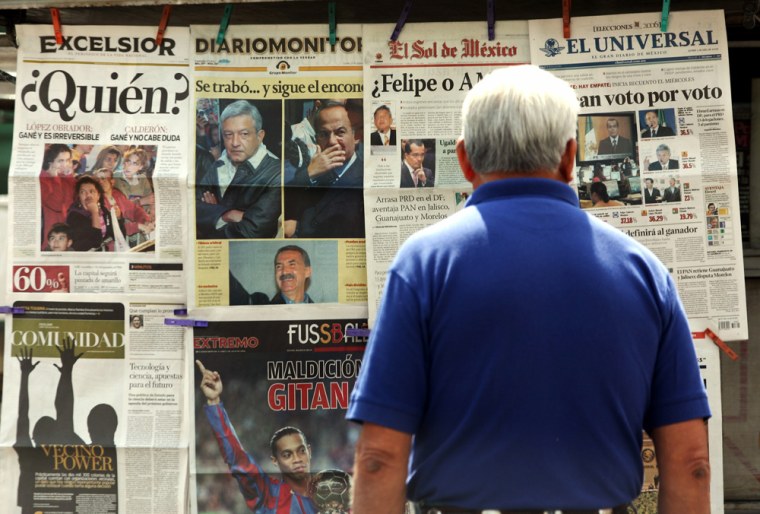“Fraud! Fraud!" they shouted as they stood in a steady downpour. The noisy demonstration, by supporters of candidate Andrés Manuel López Obrador, capped a bizarre evening in Mexico's presidential election.
One of Mexico's most popular exports to the United States are "telenovelas," Spanish-language soap operas that command huge audiences among Latinos. This election has turned into its own sort of telenovela, complete with cliffhanger suspense designed to keep people tuning in.
An official told a national television audience that the results wouldn't be available until after a detailed recount of millions of ballots later this week. So, Mexicans will have to wait to learn whether their new president is a leftist who styles himself as a champion of the poor or a pro-business conservative who says his opponent's policies will drive Mexico into bankruptcy.
That didn't stop both front-runners from declaring victory. The candidate on the left, López Obrador, joined his angry supporters in Mexico City's central plaza and told them, "Smile: We've already won."
His conservative opponent, Harvard-educated Felipe Calderón, claimed that exit polls and the first, unofficial count show him ahead. "We have no doubt that we have won," he said, but added that he would wait for the official tabulation. He said he was sure that the authorities would declare him the victor.
Unity elusive
"When I am president," he said, "I will call for a government of national unity." But at this moment, unity appears to be an elusive goal. Calderón's supporters fear that if he is declared the winner, followers of his opponent will protest in the streets, ushering in a period of civil unrest.
The Mexican media scrambled to make sense of the stalemate: "Now we're beginning to look like the United States," said political commentator Lorenzo Meyer in a television interview. Indeed, this extremely close race evokes memories of the 2000 U.S. presidential election, which was settled by the Supreme Court in favor of George W. Bush.
A popular Mexico City newspaper, Excelsior, carried a one-word headline Monday: “¿Quién?” Spanish for "Who?" Another, El Universal, declared, "They Fight Vote for Vote."
"Democracy is messy," said Mexican historian Enrique Krauze, borrowing the line that U.S. Defense Secretary Donald Rumsfeld used to describe Iraq's struggles. "The new president is going to have to form coalitions," he said, noting the deep divisions in this country between rich and poor, north and south.
Ballots at the Starbucks
The dramatic divide in Mexico's electorate was amply illustrated Sunday at one polling place in Polanco, an upscale Mexico City neighborhood. Here, volunteer poll workers sipped $3 lattes from a nearby Starbucks as they handed out ballots to choose the president of a country where half the population lives on less than $5 a day. The global economy has left millions of Mexicans behind.
One of those who cast a vote at this precinct was Jorge Castañeda, the former foreign minister of Mexico. He said people in the United States should care about this election. "Whatever happens in Mexico," he said, "affects the U.S. directly in terms of immigration, trade, drug enforcement, tourism, everything."
He pointed out that the lives of Americans and Mexicans are highly intertwined, noting, "A million Americans live in Mexico; 10 million Mexicans live in the U.S."
On the border, south of San Diego, a number of Mexicans who are now U.S. residents crossed over to vote at a precinct just south of the fence that divides Mexico and the United States.
"I didn't leave Mexico because I didn't love my country," said Mario Arias, a computer software engineer who now lives in Laguna Hills, Calif. "I left because I wanted a better life for my family."
While conditions have improved for many middle- and upper-class Mexicans under President Vicente Fox, whose administration managed to keep inflation and interest rates in check, Fox has failed to create as many jobs as he promised, even as some Mexicans were able to buy homes and cars for the first time.
Economy, crime, corruption
Now it will be up to the eventual winner to try to further energize the Mexican economy as he also grapples with the problems of corruption, crime, Mexico's violent drug lords and the perennial issue of illegal migration across the U.S.-Mexico border.
But any new programs put forth by the new President could by stymied by a deeply divided legislature split three ways among his party and two others.
George Grayson, a government professor from the College of William and Mary, who traveled to Mexico City to observe the election, said he believes that Mexico needs to become more competitive by breaking up monopolies that control key industries such as petroleum, telecommunications and building materials.
"Unless the next president addresses those bottlenecks," Grayson said, "then China, which is now eating Mexico's lunch, is going to start eating Mexico's breakfast and dinner also."
But first, Mexico has to figure out who its next president is.
George Lewis is an NBC News correspondent; Cecilia Alvear is an NBC News producer.
